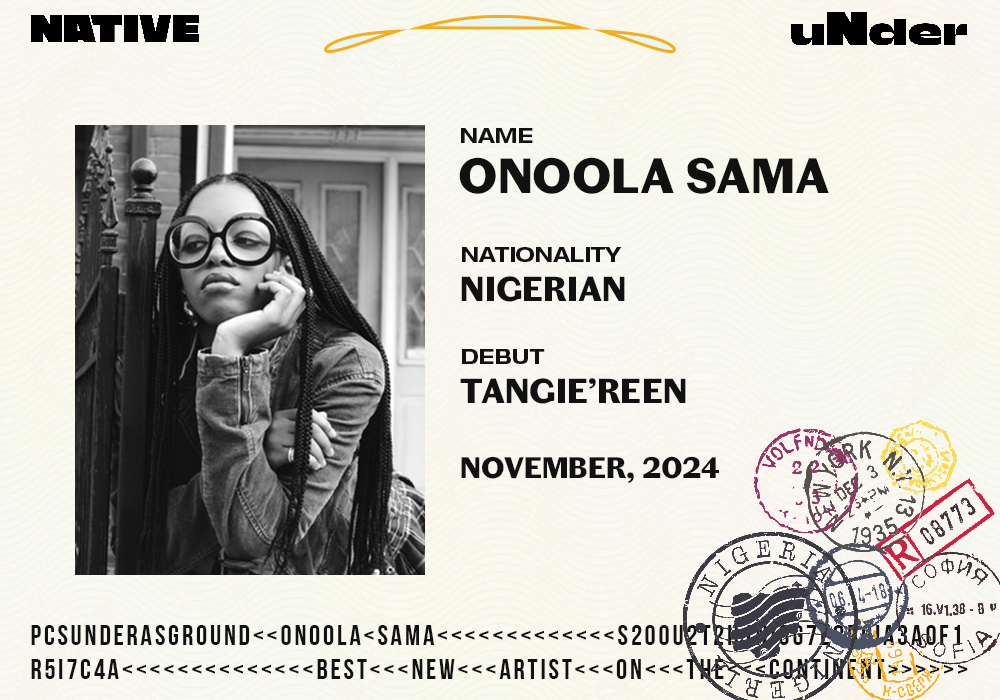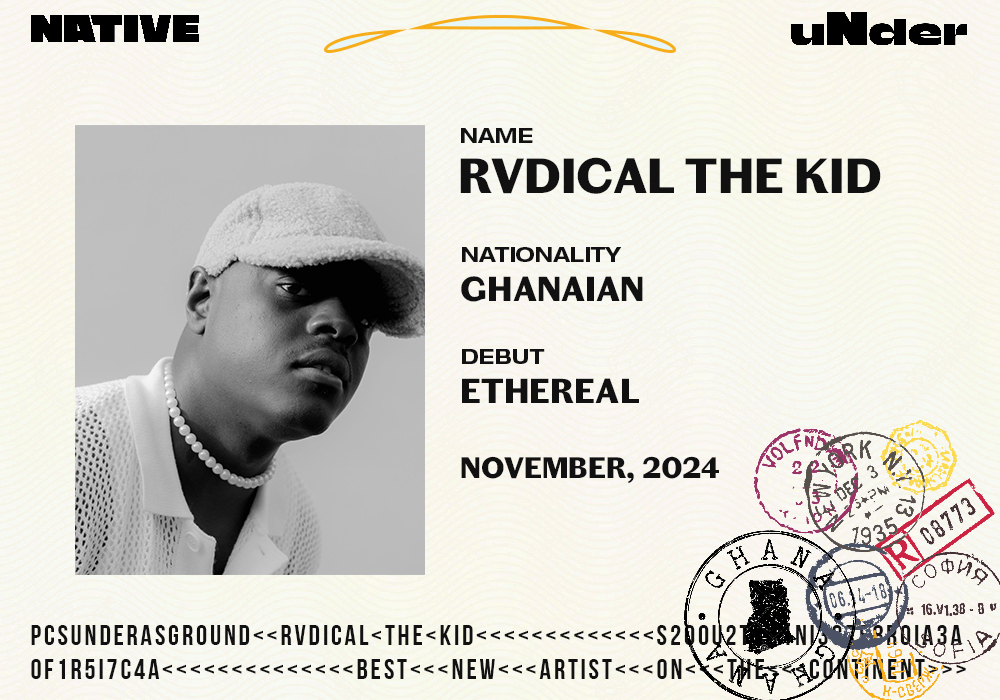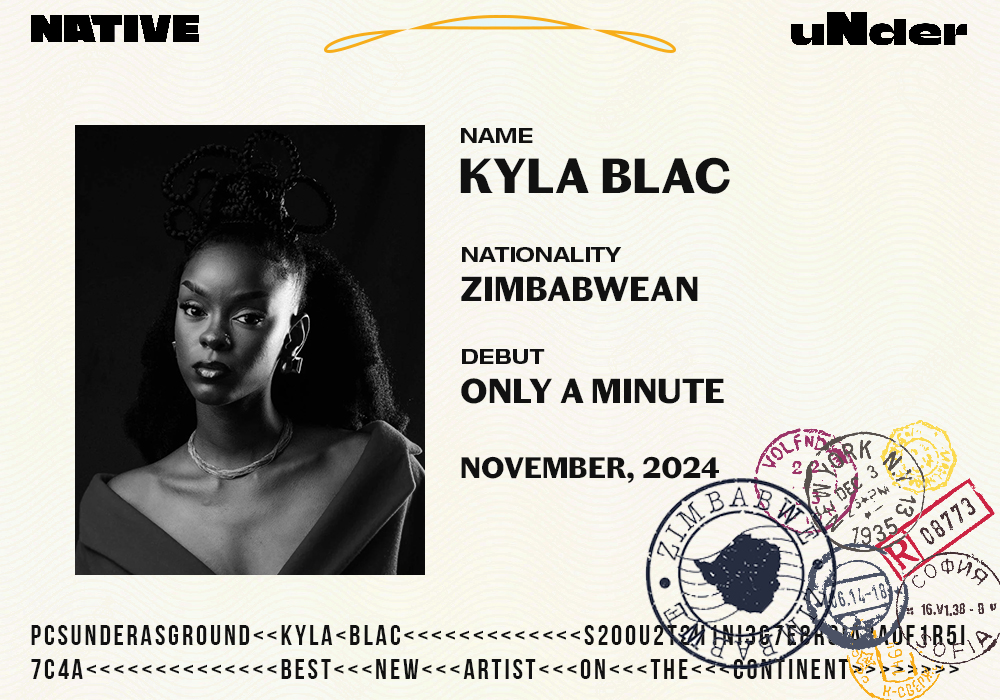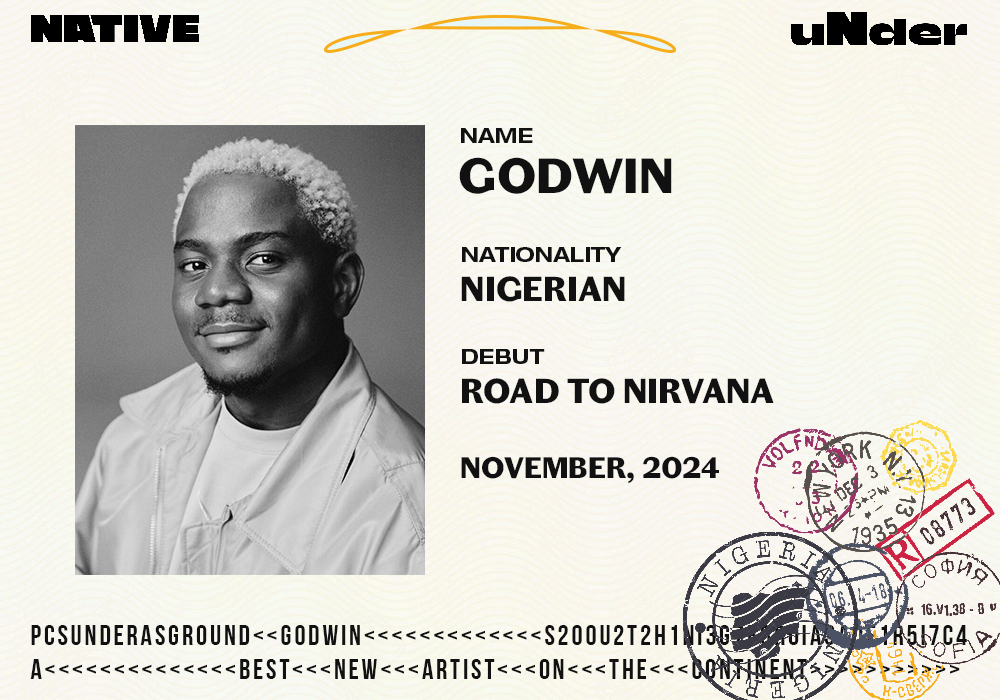uNder: Best New Artists (November 2024)
Featuring Rvdical The Kid, Onoola Sama, Godwin and Kyla Blac
Featuring Rvdical The Kid, Onoola Sama, Godwin and Kyla Blac
As the year draws to a close and we look back at some of its best music, there’s no denying how much of 2024’s soundscape was powered by fresh, audacious voices from across the continent who were willing to take chances, step outside of the creative boundaries of their predecessors and carve out their own unique lane in Africa’s music scene.
Take Godwin, the Kaduna, Nigeria-born singer whose deep, introspective records have not only resonated with listeners of his own music, but with moviegoers as well; or Onoola-sama, who continues to build a cult following with her eclectic but recognizable sound throughout her steady climb to stardom.
Rvdical The Kid, whose free-flowing melodies speak to his global influences is just another example of the direction that African music is taking these days – distinct in its own sound, but still having multiple entry-points for any listener. And Kyla Blac, for her part, brings her soulful creations to life with the confidence that many seasoned artists still seek to find in their music. With voices like these leading the way, there’s a lot to be excited about over the next year in African music.

For fans of: Moyoswrld, Len, DEELA
It’s hard to put your finger on the kind of music onoola-sama makes. In her Spotify bio, she describes her music as “super cool fun hot sexy music” – and while that’s fairly accurate, it does not adequately capture the breadth of her hugely imaginative sound. The Toronto-based artist is a genre-agnostic shapeshifter who tinkers with some of the decade’s most prevalent and obscure subgenres like Vapor Trap, Alt-R&B, Shoegaze and even blown-out Bedroom rap to create a kinetic fusion with a foot in almost every corner of today’s internet. While her earlier releases like “tangie’reen,” “magenta” and her 4-track debut ‘ode2me’ were all characterized by ethereal, dreamlike production and delivery, 2022’s boisterous “B1TCH3S!” quickly dispelled any notions that onoola-sama could be tied down to a specific genre or sound.
If her initial releases showcased her wispy vocals and melodies, “B1TCH3S!,” which came in late 2022, proved she is just as compelling spitting cutthroat bars over animated beats as she is singing emotionally-charged tunes. Her varying styles all came together on ‘i want what i want,’ her second official project which came in 2023. While the project is also buoyed by eerie production, onoola-sama swaps out some of the melancholic autotuned singing that defined ‘ode2me’ for raging growls about convoluted relationships, drugs and designer clothing, highlighting her versatility and willingness to experiment.
In 2024, onoola-sama’s desire to constantly play with sounds has not diminished in the slightest. After releasing a few successive singles – “myheartbreakparty,” “BRASH,” and “onoola-chan” – through the year that further explored her “super cool fun hot sexy” sound, she released the Soca-inspired ‘fujiBouyon*’ in September. The 3-track pack that takes huge influence from Dominica’s Bouyon music melds frenzied dancefloor energy with some innovative rapping and singing. “fêteRock*,” the standout track on the single pack is an incredibly infectious banger that features a brilliant and fun verse from rising rap star DEELA and begs for the meanest waist whine. “tequila, gin & rum,” onoola’s latest release sees her take another sonic excursion, this time experimenting with other alternative Hip-hop sounds and proving time and time again that she’s not one to be boxed in. -B.A

For fans of: Odunsi (The Engine) and Tay Iwar.
Look past the sonic abstractions of Rvdical The Kid’s music and there’s a warmth just beneath the surface that hints at a deeper vibrancy. Influenced by Hip-hop but not allowing himself to be limited by its stylistic components, the producer and singer’s music draw from a wide pool of sources that includes Jazz, Shoegaze, and Neo-R&B. Born in Nigeria, and raised in Benin and Baltimore, Rvdical’s music distills distinct aspects of those cultures into a style that’s refreshingly unique and enjoyable while prioritizing self-expression. “I’m definitely global,” he said in an interview with Floor Mag. “I feel like I allow all those parts of myself to express themselves naturally without putting too much thought into it. “I have so many influences so being more of a musician, I feel like I’m a sound curator.”
Rvdical’s preference for free-flowing creation is evident in the unhurried groove of his music and how it rarely follows a defined structure. The instrumentals are orchestral and self-gratifying and the vocals can be fizzing whispers or booming utterances, depending on what Rvdical feels like. He first made an introduction with his 2015 album, ‘Carte Blanche,’ a celebration of freedom and non-conformity that packed skeletal instrumentals, soulful ballads, and dancefloor summons in just seven tracks. Opener, “Miles Away,” pulsates with the essence of being disconnected from the world while the Maesu-featuring “Dopamine” is a lo-fi affirmation of feeling as good as can be.
Just as he emerged onto the scene with a certain mystique, Rvdical retreated for a while before emerging in 2020 with a new extended play titled ‘Little Planet.’ Just like ‘Carte Blanche,’ it’s a beat-led effort with more colour splashed across its runtime, a legacy of his return to Ghana after completing a degree at the University of Maryland. “One thing I do know is that since moving to Accra my sound has become more open, and I would definitely blame the sun for that,” he said in an interview with Asbo Magazine. “Because you can’t be hot and depressed in the sun, so melodically, harmonically the music just naturally becomes brighter.” Whether collaborating with ‘TAYDK’-era Amaarae on the ethereal “Nasa” or Nonso Amadi on “Often,” ‘Little Planet’ offers a unique spin on his electronic style that hints at mastery. – W.O

For fans of: Amaeya, Kold AF & Qing Madi
After only a couple of features, Kyla Blac made her debut with a 4-track EP, arriving seemingly more confident than most. Although ‘Only A Minute’ leaned in the low-fi direction, stacked with brief tracks and fleeting messages, Kyla’s soulful vocals are hard to miss. From “Unapologetic,” which offered a glowing Pop-leaning soundscape to “Find Ur Way,” geared more towards R&B while presenting her lush chords over a rhythmic balance between singing and rapping, Kyla Blac is clearly comfortable in her musical lane. After that, the Zimbabwean native took a step back only to return three years later with “PROBLEM”. The Murphy Cubic-production featured daunting piano keys and a reverberating bass where Kyla bitterly reminisces of a previous relationship.
Still, her moment feels like it has only just begun with more refined tracks like “Some Day” under her belt. The Neo-Soul contribution features her infectious vocals stretched across various notes, briefly creating an illusion of multiple voices. She talks about chasing success like there’s no tomorrow and remaining motivated by her responsibilities and support system; “Keep going till I break the chain, too many eyes have prayed for it,” she sings. Thereafter, she joined Sylent Nqo for a heartbreak anthem dubbed “Good One” and Afro-pop number “Energy ” assisted by Da_Kudu and Kbrizzy. For all those ruled by love and searching for those with similar perspectives, look no further than Kyla Blac for all the anguish and buoyant thrills of romance. -N.I

For fans of: Asa, Jacob Banks, Dwin The Stoic
Born and raised in Kaduna, Godwin’s music is characterised by his familial experiences, producing what can best be described as kinfolk music. His debut EP, ‘Road to Nirvana,’ released earlier this year, is a tapestry of lived experiences, marked by loss, love, and resilience, with his riveting vocals weaving a fabric of warmth and relatability.
Long before turning to music, Godwin was a celebrated filmmaker and the founder of The Critics, a Kaduna-based film collective popular for its DIY sci-fi films that gained local and international attention from big names in film such as Morgan Freeman. This filmmaking background is evident in Godwin’s lustrous ability to paint evocative emotional landscapes through his lyrics and melodies. Listening to his music can sometimes feel like watching an indie film — raw, authentic, pulsating with emotion and rich with storytelling. This cinematic appeal is one of the most distinct cornerstones of Godwin’s artistry. His latest single, ‘Blood for Blood,’ was featured by Paramount Pictures as one of the soundtracks to the 2024 thriller, ‘Gladiator 2’. The core of Godwin’s artistry is the intimacy across his music, that can be likened to a heartfelt conversation with a close friend. Tracks like “Proud of You” and “Now” from ‘Road to Nirvana’ are rooted in universal themes of self-discovery and grief, earmarking his unique ability to turn deeply vulnerable moments — such as the loss of his mother — into sing-along rhythms.
The 23-year-old expertly blurs the lines between Folk and Alternative music, using minimalist instrumentation, often led by acoustic strings and piano, to set the stage for his spell-binding stories. Ultimately, Godwin’s art isn’t just about the music; it’s about a shared connection with the listener through relatable experiences. Fresh off opening act duties on the European leg of Tems’ ‘Born In The Wild’ tour, and a feature on the soundtrack of the blockbuster, ‘Gladiator 2,’ Godwin is undoubtedly one of the most promising emerging talents today. With a pristine blend of filmmaking and music, the Kaduna native’s art stands as an invitation to feel deeply, dream boldly, and embrace the beauty of shared humanity. – J.F.

